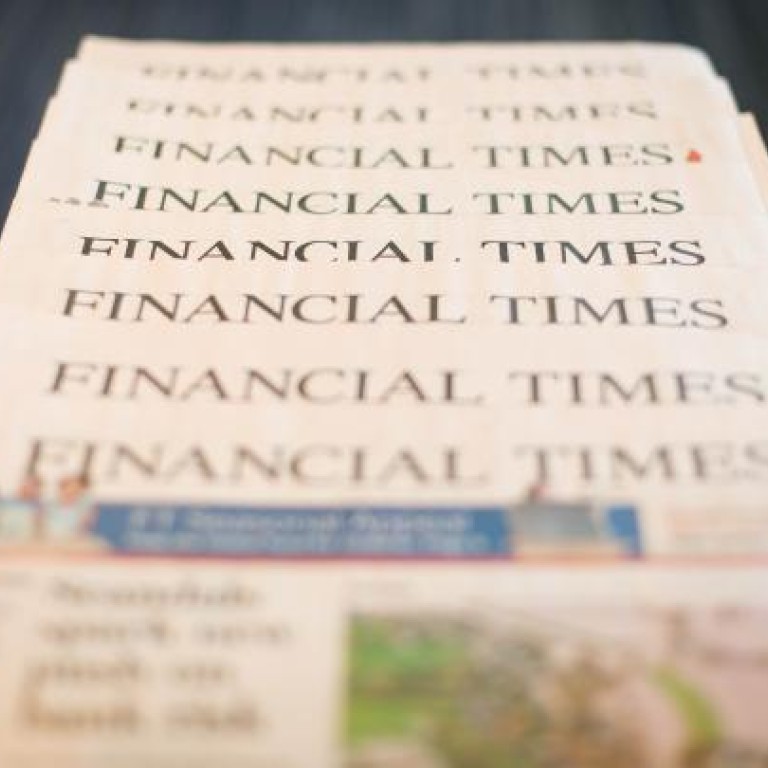
Signs of the Times
British media group Pearson is looking for a buyer of its flagship newspaper FT in China but the indications are that a deal will not happen
Three months after British media company Pearson reportedly started testing the waters for a possible sale of its flagship newspaper, the Financial Times, the company’s advisers have come all the way to China in their search for potential buyers.
But a Chinese buyer is highly unlikely to make a bid for the storied newspaper, mostly for political reasons, according to a well-placed person at one of the media groups that was approached.
Perhaps most intriguing is the fact that Pearson may even consider selling one of its crown jewels to a Chinese buyer at all, which perhaps reflects just how difficult the market has become for print publications that once ruled the global media market.
That Pearson’s advisers are looking in China also highlights the fact that the Chinese media is relatively cash-rich, since many of the biggest media groups have near-monopoly status in their markets and often have diverse holdings that run from print to broadcasting to new media.
The quest by Pearson’s advisers reflects the broader ambitions of Chinese companies, which lately have been trying to become more global as Beijing seeks to build a stable of world-class firms that can compete around the world.
Outward-looking Chinese firms have seized on lingering effects of the global financial crisis to pick up global assets from cash-strapped owners at bargain prices, making major purchases in sectors such as energy and food.
But the global media may be one sector that is not quite ready for major mergers and acquisitions from China, largely because of the huge cultural differences that still exist between Chinese and Western firms.
The FT saga first burst into global headlines last autumn, when the media reported Pearson was looking to sell the paper and the most likely buyers would include financial media groups Thomson Reuters and Bloomberg, as well as Rupert Murdoch’s News Corp, owner of the Wall Street Journal and Dow Jones Newswires.
Reports about a month ago indicated Bloomberg was indeed interested.
This sniffing around for interest from China probably indicates either that any Bloomberg talks have stalled, or perhaps that Pearson’s advisers are trying to start a bidding war.
Chinese media are all state-owned at some level, and all practise a form of state-mandated self-censorship that is regularly condemned by the West. What’s more, many maintain journalistic practices that most Western media would consider unethical, such as taking money for writing positive news stories after attending news conferences.
But these are not ordinary times, and in fact Pearson may realise that it may not be long before the FT follows in the footsteps of other formerly well-known publications such as Business Week and Newsweek, both of which were essentially “sold” for very little after they suffered big drops in readership and their profits evaporated.
In that environment, there probably are not too many Western buyers which would want to pay a premium for the FT.
Some believe China’s media may be standing on the cusp of a breakthrough as it tries to take on the role of society’s watchdog rather than mouthpiece for the party. That transformation has been on prominent display in Guangdong, where reporters at the progressive Southern Weekend have gone on strike to protest against being forced by propaganda officials to toe the party line.
So, what exactly are the chances of a Chinese buyer stepping forward to buy the FT, and who may such a buyer be?
The chances of the paper being sold to a Chinese buyer are perhaps less than 10 per cent. China would probably never allow one of its media groups to own such a high-profile Western publication, in the light of such conflicting media cultures.
Equally important, FT staff would probably revolt and leave the paper en masse if they found out it was going to be bought by a Chinese company.
In the unlikely event of a deal, the only Chinese media group with the credentials to make such a bid is probably Nanfang Media, which enjoys a reputation as one of the country’s most daring publishers and owns the 21st Century Business Herald, one of the leading financial newspapers. The group also happens to be the parent of Southern Weekend. But even Nanfang could find its hands tied, as the authorities in Guangdong and Beijing would probably step in quickly to kill such a deal.
At the end of the day, a China deal stands little or no chance of happening for political and cultural reasons, and Pearson will undoubtedly have to settle for selling the FT at a price well below the premium it is now seeking.
Doug Young blogs on scmp.com

